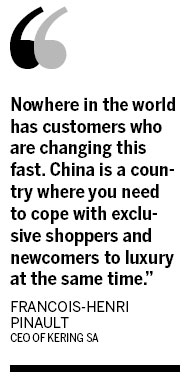


While the outlook for luxury brands has been dimmed by fears that their high double-digit growth in China might soon end, exclusivity remains the strategy favored by French luxury group Kering SA to weather slowing growth in the country.
"It is not about raising prices on the same product but about making incomparable products and bringing even more exclusive products that use much more leather and precious material to the market," said Francois-Henri Pinault, chief executive officer of the French luxury house, which owns brands including Gucci, Saint Laurent Paris and Bottega Veneta, in an interview.
Kering's strategy of exclusivity meant increasing the average price of Gucci items by about 10 percent, a move that hit sales in the latest quarter. The brand's revenue tumbled 5.4 percent in the third quarter to 865 million euros ($1.19 billion), according to the group's financial statements.
Gucci has also been struggling to maintain high growth in China. Comparable-store sales in the Asia-Pacific region contracted 2 percent in the third quarter as Chinese demand declined.
Kering's rivals - LVMH Group and British luxury house Burberry Group Plc - have taken similar hits to their once-booming China sales.
But Pinault shrugged off concerns about the Chinese economic slowdown and the new leaders' crackdown on corruption and conspicuous spending, which have been cited as the causes of recent weaker sales in China.
Those factors "had an impact for sure, but it will be short-term," he said. "We should not underestimate the growth of tourism in China. If we consider Chinese consumers buying our brands in France, the United Kingdom and Italy, in addition to buying at home, we are still growing very fast."
Sales in the Asia-Pacific market have generated about one-third of the total sales of Kering's luxury division. The percentage is believed to be even higher if overseas luxury spending of Chinese tourists is taken into account.
Pinault said he remained confident about the prospects for the Chinese market, given the growth potential of per capita GDP and the purchasing power as the country shifts toward a consumption-driven growth model.
But a report by consulting firm Bain and Co warned that growth of the Chinese luxury market will plummet this year to about 2.5 percent at current exchange rates, down from 20 percent in 2012.
Pinault admitted that luxury brands are facing increasing challenges in China as the tastes and habits of the Chinese consumers are changing rapidly.
"Nowhere in the world has customers who are changing this fast. China is a country where you need to cope with exclusive shoppers and newcomers to luxury at the same time," Pinault said.
"We need to adapt our brands to the reality of each city", he added.
Unlike some of his rivals, Pinault doesn't believe in the strategy of developing a brand to cover all price segments.
"It could endanger the exclusivity of the brand. The way we develop our brands is horizontal, which is enlarging the brand category at the same price segment dealing with the same consumers and trying not to go down," he said.
Last year, the French group acquired the Chinese jewelry brand Qeelin, a relatively new and smaller brand with ample scope for growth, to tap into the burgeoning Chinese luxury market and enrich the group's brand portfolio.
Pinault said mid-size brands with annual revenues of 200 to 400 million euros and brands at the entry-level price segment will be Kering's priority when it comes to future acquisitions.
While Gucci is experiencing sluggish growth, other brands in the Kering stable such as the Spanish label Balenciaga and the Italian high-end brand Bottega Veneta continue to see high growth in the Chinese market.
"Double-digit growth is still achievable for us, although it will not be high," said Isabelle Guichot, Balenciaga's chief executive officer.
Currently running 17 stores in China, the brand plans to add two to three stores every year .